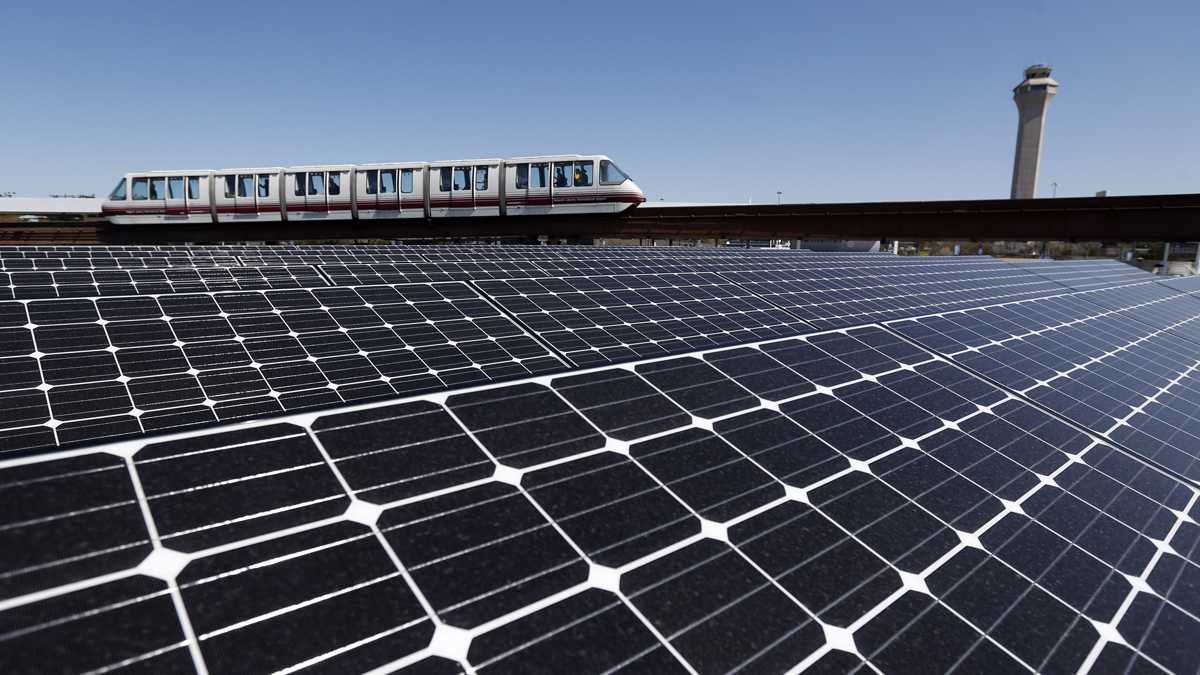Trump pulls out of Paris, but he can’t cancel the future

Solar panels on the roof of the building supplying energy to the AirTrain at Newark Liberty International Airport soak up the rays. (AP file photo)
Donald Trump has sullied himself, and this nation, by withdrawing from the Paris climate change pact. But, believe it or not, there’s a silver lining.
He can’t turn back the clock. Renewable green energy is the future, regardless of what he says or does, because the corporate sector is increasingly committed to giving the people what they want.
Granted, it was hard to feel optimistic yesterday after listening to Trump’s litany of lies and misrepresentations — like when he said that the pact barred us from building new coal plants (it doesn’t, because the pact’s terms are voluntary; and nobody wants to build coal plants anyway, because utilities are switching to cleaner alternatives); like when he said “we’re getting out, but we’ll start to negotiate” (the 195 signatory nations laughed at that, because there’s nothing to negotiate); like when he said “I was elected to represent the citizens of Pittsburgh, not Paris” (the citizens of Pittsburgh resoundingly rejected him last November; Pittsburgh’s economic rebirth has been spurred by science and high tech, not coal and steel).
But Trump is always gonna do his thing, serving his hard-core minority slice of the electorate, and it’s incumbent on the rest of us — if only for the sake of sanity — to find the chinks of sunlight. And lo and behold, here they are:
Many corporate leaders say that [Trump’s pullout] will have little impact on their investments [in green renewable energy] … Companies said they wouldn’t change course. Companies are responding to customer and shareholder demands to reduce greenhouse-gas emissions. Many operate in states and countries that are putting in place climate rules, and thus face pressures beyond the U.S. government.
Firms are buying natural gas and renewable electricity that emit less pollutants because they are becoming cheaper. And many are making long-term capital investments to reduce their carbon footprints with an eye toward future decades, not the current election cycle.
That’s from today’s edition of The Wall Street Journal, which quoted the chief executive of General Electric: “Climate change is real. Industry must now lead and not depend on government.”
Industry is being prompted to lead because of grassroots pressure. Trump and his flat-earth Republican partners are powerless to stanch that pressure.
When Exxon held its annual meeting Wednesday, 62 percent of shareholders voted for a resolution which demands that the corporation’s leaders share more info about how climate change is affecting Exxon’s business. Elsewhere, one of the largest U.S. utility companies, American Electric Power, said yesterday that it has been shifting steadily toward more use of gas, wind, and solar, because those options are becoming increasingly inexpensive – and thus more popular with customers. And major companies like Wal-Mart and Google are pushing hard for the utilities to prioritize cleaner power.
Indeed, as The Journal pointed out, U.S. energy-related carbon emissions are now at their lowest level since 1992 — because of the ongoing shift from coal-fired power to natural gas and renewables. No surprise there. The international green-energy revolution, which is irreversible, has made what was unaffordable as recently as 2009 emininently affordable today. According to federal data, the amount of new solar and wind capacity that was added in 2016 alone “equaled the total amount of coal power brought online over the past 15 years.”
This revolution is broadly popular; according to a national poll last fall, 89 percent of Americans want more emphasis on solar energy and 83 percent say the same about wind. (Support for more coal: 41 percent.) And on the job front, solar and wind employ triple the amount of people who work on coal — and that gap is widening. Trump can’t reverse these realities with a burst of Rose Garden blather.
And even though some of the car companies are happy that Trump is loosening President Obama’s mileage-economy standards, they still have to compete internationally with greener rivals in countries that have tougher mileage requirements — as well as in U.S. states (most notably California) that are free to impose and enforce tougher requirements than the federal norm.
To reiterate: Corporations are investing heavily to reduce their carbon footprints with an eye toward future decades, not the current election cycle. They’re playing the long game on going green — thanks to the market forces that Republicans profess to revere. Trump may do damage in the short run, but he’s likely to be just a pothole on the inexorable road to progress.
—
Follow me on Twitter, @dickpolman1, and on Facebook.
WHYY is your source for fact-based, in-depth journalism and information. As a nonprofit organization, we rely on financial support from readers like you. Please give today.

